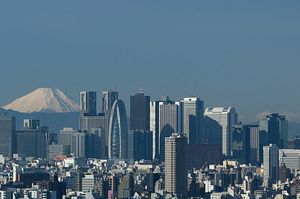The government of Prime Minister Shinzo Abe and the Bank of Japan remain confident that the three-pronged Abenomics policy will continue to bring the country out of deflation and set it on the path of sustainable economic growth. Despite dismal economic figures for the second quarter, which showed a year-on-year growth decline of 6.8 percent, and inflation leveling off at around 1.3 percent (short of the BOJ’s two percent target), both the government and the BOJ appear intent on maintaining course, with Abe still considering a further increase in the consumption tax to 10 percent next year. Predictions of a return to growth in the third quarter are currently girding government optimism, while long-term sustainable growth still remains questionable.
There were two sets of statements to come out of the BOJ since last weekend. On Saturday while speaking at a central banking conference in Jackson Hole, Wyoming, BOJ governor Haruhiko Kuroda gave no indication that the bank would slow its aggressive policy of monetary easing in the near future in order to meet its target. With the effect of April’s consumer tax increase factored in, the current rate of 1.3 percent has been deemed acceptable, despite expectations that the weak yen’s failure to improve imports will mean inflation dips further by the end of the year. Kuroda said the BOJ’s efforts were proving effective, however, and that it is necessary the public be convinced that the inflation target will be reached so that companies will increase wages, which the BOJ sees as the key to stable inflationary growth. Kuroda said he wants the two percent inflation target to become the standard for future wage negotiations, and that because of Japan’s declining population, women and older workers would need to be incentivized to enter the labor market.
The other set of statements this week came from sources “familiar with the BOJ’s thinking” that spoke with the Wall Street Journal’s “Real Time Japan” section. These sources largely corroborate Kuroda’s statements, but indicate that the bank will rely on language to drive inflationary expectations in the short-term, without actually increasing its stimulus policy. In an upcoming monthly report, the BOJ will say that “the nation’s economy remains on a recovery track,” despite the second quarter growth numbers and flagging inflationary growth. The BOJ believes that the shrinking labor pool and a slight uptick in wages will moderate these recent numbers in the coming quarter, and that while “the state of consumption is uneven and bipolar… consumption is solid as a whole,” as the effect of the consumption tax is “moderating.” The one area where these sources remain doubtful is whether inflation will pick up again later this year. While they don’t expect inflation to dip below one percent, sluggish exports due to weak international demand (and a sluggish global economic recovery in general) will likely hamper this side of the economy’s ability to contribute to growth.
In addition to the BOJ’s public commitment to staying the course on the current economic policy, Abe’s next consumption tax increase received support from outside the ruling LDP, as former Prime Minister Yoshihiko Noda (who formulated the increase before losing power) said that a failure to increase the consumption tax next year to 10 percent would “send the message at home and abroad that Japan is not sticking to fiscal discipline [and] would have a very bad impact.” However, Noda also questioned whether Abe’s other policies of quantitative easing, government spending and structural economic reform would lead to sustainable growth. In particular, Noda questioned Abe’s structural reforms, which he said don’t appear to be having an effect. One of Abe’s most touted reforms, a decrease in corporate tax from 35 percent to less than 30 percent, “would have minimal impact given less than one-third of all companies pay taxes,” and that “voters hit by the sales tax rise would perceive a corporate tax cut as giving favorable treatment to companies over consumers.”
The government’s assumption that the worst of the effects of April’s tax increase are over will be tested with the next quarterly GDP figures. However, the long-term sustainability of the current economic policy is less certain. The next tax hike decision in particular will be difficult, as Abe will not want to induce another sharp hit to growth, and possibly derail his economic policy. On the other hand, not following through on the increase could scare financial markets with a signal that the government is not serious about addressing its budgetary gaps, and the developed world’s largest debt to GDP ratio.
































